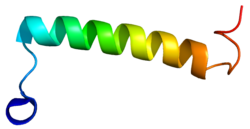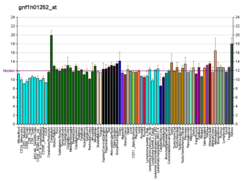UCN3
 From Wikipedia - Reading time: 6 min
From Wikipedia - Reading time: 6 min
Urocortin-3 is a protein that, in humans, is encoded by the UCN3 gene.[5][6] It belongs to the corticotropin-releasing hormone family.[7]
Function
[edit]This gene is a member of the sauvagine/corticotropin-releasing factor/urotensin I family. It is structurally related to the corticotropin-releasing factor (CRF) gene and the encoded product is an endogenous ligand for CRF type 2 receptors.
In the brain it may be responsible for the effects of stress on appetite. In humans, it is also expressed by alpha cells and beta cells in the pancreas and is co-released with glucagon and insulin to promote somatostatin release from neighboring delta cells, which provides negative feedback on glucagon and insulin secretion.[8] In spite of the gene family name similarity, the product of this gene has no sequence similarity to Urotensin-II.[6]
References
[edit]- ^ a b c GRCh38: Ensembl release 89: ENSG00000178473 – Ensembl, May 2017
- ^ a b c GRCm38: Ensembl release 89: ENSMUSG00000044988 – Ensembl, May 2017
- ^ "Human PubMed Reference:". National Center for Biotechnology Information, U.S. National Library of Medicine.
- ^ "Mouse PubMed Reference:". National Center for Biotechnology Information, U.S. National Library of Medicine.
- ^ Lewis K, Li C, Perrin MH, Blount A, Kunitake K, Donaldson C, Vaughan J, Reyes TM, Gulyas J, Fischer W, Bilezikjian L, Rivier J, Sawchenko PE, Vale WW (Jun 2001). "Identification of urocortin III, an additional member of the corticotropin-releasing factor (CRF) family with high affinity for the CRF2 receptor". Proceedings of the National Academy of Sciences of the United States of America. 98 (13): 7570–5. Bibcode:2001PNAS...98.7570L. doi:10.1073/pnas.121165198. PMC 34709. PMID 11416224.
- ^ a b "Entrez Gene: UCN3 urocortin 3 (stresscopin)".
- ^ Zhang X, Liu Y, Qi J, Tian Z, Tang N, Chen D, Li Z (2019). "Progress in understanding the roles of Urocortin3 (UCN3) in the control of appetite from studies using animal models". Peptides. 121: 170124. doi:10.1016/j.peptides.2019.170124. PMID 31415798. S2CID 199544428.
- ^ van der Meulen T, Donaldson CJ, Cáceres E, Hunter AE, Cowing-Zitron C, Pound LD, Adams MW, Zembrzycki A, Grove KL, Huising MO (Jul 2015). "Urocortin3 mediates somatostatin-dependent negative feedback control of insulin secretion". Nature Medicine. 21 (7): 769–76. doi:10.1038/nm.3872. PMC 4496282. PMID 26076035.
Further reading
[edit]- Hauger RL, Grigoriadis DE, Dallman MF, Plotsky PM, Vale WW, Dautzenberg FM (Mar 2003). "International Union of Pharmacology. XXXVI. Current status of the nomenclature for receptors for corticotropin-releasing factor and their ligands". Pharmacological Reviews. 55 (1): 21–6. doi:10.1124/pr.55.1.3. PMID 12615952. S2CID 1572317.
- Florio P, Torres PB, Torricelli M, Toti P, Vale W, Petraglia F (Dec 2006). "Human endometrium expresses urocortin II and III messenger RNA and peptides". Fertility and Sterility. 86 (6): 1766–70. doi:10.1016/j.fertnstert.2006.05.041. PMID 17074339.
- Imperatore A, Florio P, Torres PB, Torricelli M, Galleri L, Toti P, Occhini R, Picciolini E, Vale W, Petraglia F (Jul 2006). "Urocortin 2 and urocortin 3 are expressed by the human placenta, deciduas, and fetal membranes". American Journal of Obstetrics and Gynecology. 195 (1): 288–95. doi:10.1016/j.ajog.2005.12.048. PMID 16626608.
- Saruta M, Takahashi K, Suzuki T, Fukuda T, Torii A, Sasano H (Jul 2005). "Urocortin 3/stresscopin in human colon: possible modulators of gastrointestinal function during stressful conditions". Peptides. 26 (7): 1196–206. doi:10.1016/j.peptides.2005.01.014. PMID 15949638. S2CID 23604531.
- Chang CL, Hsu SY (Oct 2004). "Ancient evolution of stress-regulating peptides in vertebrates". Peptides. 25 (10): 1681–8. doi:10.1016/j.peptides.2004.05.022. PMID 15476935. S2CID 25716793.
- Takahashi K, Totsune K, Murakami O, Saruta M, Nakabayashi M, Suzuki T, Sasano H, Shibahara S (Apr 2004). "Expression of urocortin III/stresscopin in human heart and kidney". The Journal of Clinical Endocrinology and Metabolism. 89 (4): 1897–903. doi:10.1210/jc.2003-031663. PMID 15070962.
- Seres J, Bornstein SR, Seres P, Willenberg HS, Schulte KM, Scherbaum WA, Ehrhart-Bornstein M (Feb 2004). "Corticotropin-releasing hormone system in human adipose tissue". The Journal of Clinical Endocrinology and Metabolism. 89 (2): 965–70. doi:10.1210/jc.2003-031299. PMID 14764822.
- Chanalaris A, Lawrence KM, Stephanou A, Knight RD, Hsu SY, Hsueh AJ, Latchman DS (Oct 2003). "Protective effects of the urocortin homologues stresscopin (SCP) and stresscopin-related peptide (SRP) against hypoxia/reoxygenation injury in rat neonatal cardiomyocytes". Journal of Molecular and Cellular Cardiology. 35 (10): 1295–305. doi:10.1016/S0022-2828(03)00244-X. PMID 14519439.
- Hsu SY, Hsueh AJ (May 2001). "Human stresscopin and stresscopin-related peptide are selective ligands for the type 2 corticotropin-releasing hormone receptor". Nature Medicine. 7 (5): 605–11. doi:10.1038/87936. PMID 11329063. S2CID 22916906.
 KSF
KSF




